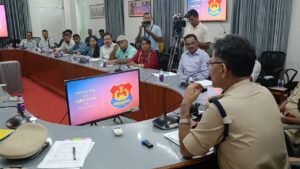DGP asks citizens to be aware of growing cybercrimes, Scams Drain Over Rs 51 Crore from Tripura Citizens Since 2021
Tripura, like many other parts of the country, is grappling with a rising tide of cybercrime, as fraudsters adopt increasingly sophisticated tricks to dupe unsuspecting people out of their savings. Since 2021, cybercriminals have siphoned off Rs 51.49 crore from citizens in the state, exposing the growing vulnerability of people in the digital age.

At a workshop and awareness programme for journalists at the Police Headquarters on Saturday, Director General of Police (DGP) Anurag sounded a strong warning, urging citizens to remain alert. “In most cases, it is either lack of awareness or greed that makes one vulnerable. People must avoid sharing sensitive details like PINs or OTPs and should never download suspicious files ending with ‘.apk’ from unknown sources,” he said.
The DGP explained that scammers frequently pose as representatives of electricity or gas departments, threatening victims with disconnection over “unpaid bills.” Others pose as financial advisors offering lucrative investment schemes or easy loans, while some set up fake identities for OLX sales, courier services, hotel bookings, lotteries, or franchise opportunities.
A disturbing new tactic called “digital arrest” has also surfaced, where criminals impersonate police officers or government agencies, intimidating victims into transferring money. Social media platforms like Facebook and WhatsApp are being misused through fake IDs to lure unsuspecting users into intimate chats, later leading to extortion and blackmail. Traditional phishing emails too continue to trick people into revealing sensitive data.
According to police data, 269 individuals have been identified as victims of cyber fraud in Tripura over the past four years. The total loss stands at Rs 51.49 crore, though the police have so far managed to recover only Rs 33.84 lakh through quick interventions.
Investigations have also led to the freezing of 20,387 bank accounts containing deposits worth Rs 5.76 crore, which authorities hope to retrieve in the coming months.
The scale of losses has been staggering in some cases. One Tripura resident lost Rs 2.3 crore in an online investment scam, while another was cheated of Rs 18 lakh through a fake franchise offer. In yet another incident, a young man was trapped via video call by a woman and forced to pay huge sums under threat of exposure.
The financial impact of cybercrime in Tripura has surged sharply in recent years:
2021: Rs1.98 crore
2022: Rs 4.62 crore
2023: Rs 9 crore
2024: Rs 25.54 crore
Till July 2025:Rs 9.77 crore
“Thanks to awareness campaigns, the figures this year are lower than in 2024. But the danger is far from over, as fraudsters constantly evolve new methods,” the DGP noted.
The problem is not unique to Tripura. Across India, cybercrime has been rising at an alarming pace. According to National Crime Records Bureau (NCRB) data, the country recorded over 65,000 cybercrime cases in 2022, a jump of nearly 25% compared to 2021. A majority of these cases involved financial frauds, phishing, and online blackmail.
The Reserve Bank of India has also flagged rising online banking and UPI-related scams. In fact, digital payment platforms have become prime targets for fraudsters, with fake “customer care” numbers, phishing links, and malware-based apps being widely used to trick customers.
Experts point out that while urban India is more exposed due to higher digital penetration, rural and semi-urban regions are increasingly falling prey as smartphone and internet access spread. States like Maharashtra, Karnataka, Uttar Pradesh, and Telangana have reported some of the highest numbers of cases, but smaller states like Tripura are not immune.
A major challenge for law enforcement across the country is that many fraudsters operate from outside India, using VPNs, mule accounts, SIM cards, and fake IDs to conceal their tracks. This cross-border nature of crime complicates investigations and slows recovery of stolen funds.
In Tripura, police officials stressed that prompt reporting is crucial to preventing further losses. “Fraudsters rely on quick transfers and layering of money. Victims must immediately dial 1930 or 112 and approach their local police station or the Cyber Crime Police Station in Agartala. Immediate reporting allows us to freeze transactions before the money vanishes,” DGP Anurag advised.
He also urged citizens to install security applications, maintain strong password protections, and avoid clicking on suspicious links or responding to unsolicited calls. “A little caution can save people from losing their lifetime savings,” he added.
While law enforcement agencies are tightening surveillance and expanding awareness campaigns, the battle against cybercrime is far from easy. The constantly evolving tactics of scammers, combined with delays in reporting by victims, make it a persistent threat.
As Tripura’s experience shows, cybercrime is not confined to metros but is rapidly spreading to smaller states and towns. Police say the only real defense is a vigilant and informed public.
All senior officers from the PHQ and Cyber Crime wing were present in the programme. Additional SP Nirdesh Deb gave an extensive PPT presentation relating to various features, patterns, styles and modus operandi of the cyber crimes being committed in the state.
|Also Read : SC Strikes Down Tripura Govt’s Cancellation of Recruitments |
|Also Read : Tripura DGP Anurag Dhyankar warns people about cyberattacks, urges them not to fall for ‘unbelievably lucrative offers of financial gain’ |













